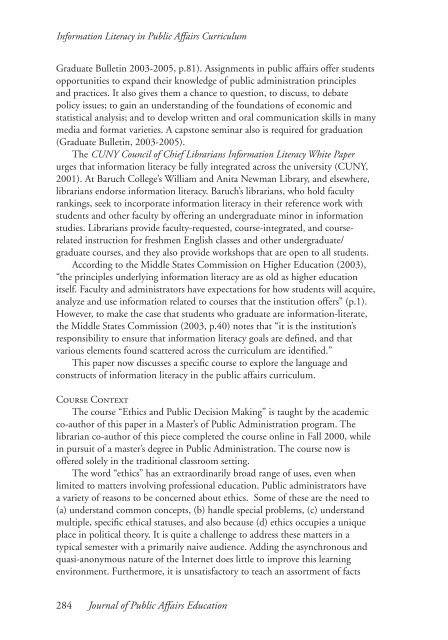JOURNAL OF PUBLIC AFFAIRS EDUCATION - Naspaa
JOURNAL OF PUBLIC AFFAIRS EDUCATION - Naspaa
JOURNAL OF PUBLIC AFFAIRS EDUCATION - Naspaa
You also want an ePaper? Increase the reach of your titles
YUMPU automatically turns print PDFs into web optimized ePapers that Google loves.
Information Literacy in Public Affairs CurriculumGraduate Bulletin 2003-2005, p.81). Assignments in public affairs offer studentsopportunities to expand their knowledge of public administration principlesand practices. It also gives them a chance to question, to discuss, to debatepolicy issues; to gain an understanding of the foundations of economic andstatistical analysis; and to develop written and oral communication skills in manymedia and format varieties. A capstone seminar also is required for graduation(Graduate Bulletin, 2003-2005).The CUNY Council of Chief Librarians Information Literacy White Paperurges that information literacy be fully integrated across the university (CUNY,2001). At Baruch College’s William and Anita Newman Library, and elsewhere,librarians endorse information literacy. Baruch’s librarians, who hold facultyrankings, seek to incorporate information literacy in their reference work withstudents and other faculty by offering an undergraduate minor in informationstudies. Librarians provide faculty-requested, course-integrated, and courserelatedinstruction for freshmen English classes and other undergraduate/graduate courses, and they also provide workshops that are open to all students.According to the Middle States Commission on Higher Education (2003),“the principles underlying information literacy are as old as higher educationitself. Faculty and administrators have expectations for how students will acquire,analyze and use information related to courses that the institution offers” (p.1).However, to make the case that students who graduate are information-literate,the Middle States Commission (2003, p.40) notes that “it is the institution’sresponsibility to ensure that information literacy goals are defined, and thatvarious elements found scattered across the curriculum are identified.”This paper now discusses a specific course to explore the language andconstructs of information literacy in the public affairs curriculum.Course ContextThe course “Ethics and Public Decision Making” is taught by the academicco-author of this paper in a Master’s of Public Administration program. Thelibrarian co-author of this piece completed the course online in Fall 2000, whilein pursuit of a master’s degree in Public Administration. The course now isoffered solely in the traditional classroom setting.The word “ethics” has an extraordinarily broad range of uses, even whenlimited to matters involving professional education. Public administrators havea variety of reasons to be concerned about ethics. Some of these are the need to(a) understand common concepts, (b) handle special problems, (c) understandmultiple, specific ethical statuses, and also because (d) ethics occupies a uniqueplace in political theory. It is quite a challenge to address these matters in atypical semester with a primarily naive audience. Adding the asynchronous andquasi-anonymous nature of the Internet does little to improve this learningenvironment. Furthermore, it is unsatisfactory to teach an assortment of facts284 Journal of Public Affairs Education
















